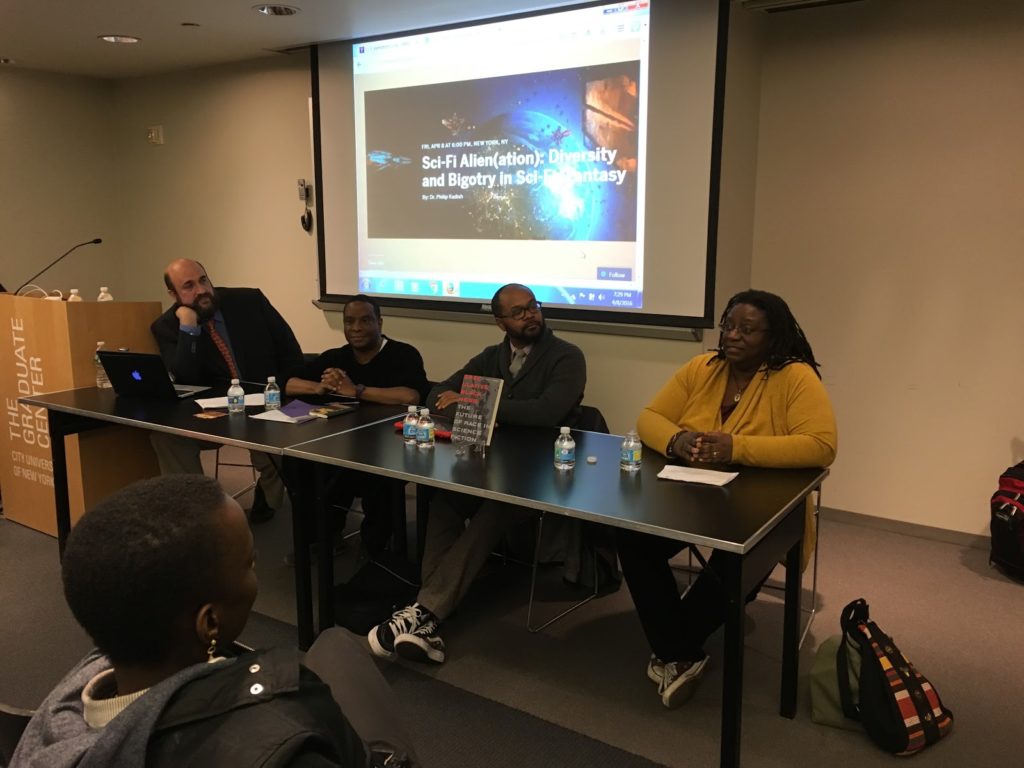The need for diversity in Science Fiction, otherwise known as Speculative Fiction, has been getting a lot of media attention as of late. Racist fanboys tried (and failed) to boycott Star Wars Episode VII for featuring a diverse primary cast. The World Fantasy Awards finally removed the face of avowed racist H.P. Lovecraft from their trophy. Most recently, the Sad/Rabid Puppies tarnished the Hugo Awards for a second straight year. Traditionally marginalized groups are becoming more visible, while the subsequent backlash is growing louder and more absurd.
It is for these reasons and more that Dr. Philip Kadish organized a panel to facilitate a much needed discussion on the growing attacks on diversity in Speculative Fiction. Gathered at the CUNY Graduate Center were panelists Andre Carrington (Speculative Blackness), Craig Laurance Gidney (Skin Deep Magic), and Jennifer Marie Brissette (Elysium).

Racism in Speculative Fiction is nothing new–it has been there since the beginning. Gene Roddenberry may have opened minds when he envisioned a future of inclusion, but there have always been the likes of Jerome B. Holgate in the midst. Moderator Phil Kadish opened the evening’s discussion with a plot synopsis from Holgate’s A Sojourn in the City of Amalgamation, one of the first Speculative Fiction books ever published. Written in 1835, it was critical of the Abolitionist movement and painted a dystopic future where slavery was no longer legal and race mixing was mandatory. In this future society, people had to build special devices to make their interracial society work; namely a sheep dip for the black partners so that their white counterparts could “stand the smell.”
Expanding on Speculative Fiction’s often problematic history, Andre Carrington talked about the paradox of Star Trek creator Gene Roddenberry. “He was a man ahead of his time, but he was also very much a man of his own time,” Carrington remarked. While Star Trek is well known for breaking new ground by featuring a black female lead as a ranking officer and having TV’s first interracial kiss, it also had episodes that displayed gross misogyny and was very much a product of its time. Yesterday’s progressive entertainment looks very different to today’s audience, and likewise today’s progressive fiction is likely to look very different in the future.

Another paradox in the genre that he spoke about was how Speculative Fiction today is “simultaneously popular and marginal at the same time.” He explained this by contrasting the massive success of superhero and franchise films like Star Wars, with the diminished respect that genre writers receive in favor of more traditional ones. Prestigious awards like the National Book Award have historically shunned genre fiction, and that is one of the reasons we have the Hugos and World Fantasy Awards in the first place. We can see things splinter further as the Hugos and it’s contemporaries have historically favored straight, white, cis-male writers. This precedent has lead to the creation of organizations like the Carl Brandon Society (a group focused on awarding writers of color) and the James Tiptree Jr Awards (an award encouraging the exploration and expansion of gender).

Keeping the topic of literary awards going, Craig Laurance Gidney took the first deep dive into the 2015 Hugo Controversy. He opened his remarks by reading an excerpt from Sad Puppies leader Brad R. Torgersen, in which Torgersen admonishes today’s Science Fiction for containing too much subtext. He glamorizes the days when books with spaceships on the cover were just books about space adventure, and not allegories for slavery or other things he’d rather not think about. Gidney then tore into this short-sighted logic for its fundamental flaw: there has always been subtext in Speculative Fiction. He specifically cited Andre Norton’s Witchworld series as a series he read as a child that was layered in subtext. A more mainstream example might be The Chronicles of Narnia by C. S. Lewis, which is widely known for it’s Christian subtext.
One of the stories believed to have triggered the Sad Puppies backlash was the 2014 Short Story Hugo winner “The Water that falls from Nowhere,” a magical realism story in which a young man comes out to his traditional Chinese family. The Sad Puppies claim they felt that conservative authors were being blacklisted, and so they gamed the system with their ballot list. Gidney’s theory is that the Sad Puppies are less about principle, and more about selling books by appealing to a targeted audience. He argues that they are trying to appeal to the Glen Beck listeners, Trump voters, and Fox News watchers. The demographic that loathes “politically correct” language and has the money to buy books. If it were about principle, he argues, they would have focused on actually nominating good conservative writers. Instead they nominated some of the most inflammatory writers they could find, namely three works by John C. Wright who is best known for his homophobic views. More of Gidney’s thoughts and writing on the Sad Puppies can be found on his website.

Jennifer Brissett then took the conversation in a different direction, choosing to focus on the issues with the Science Fiction Writers of America (SFWA). SFWA is supposed to represent Science Fiction Writers. In 2009, then SFWA President John Scalzi stated “any market not paying pro rates shouldn’t even be publishing.” In reality, a lot of small presses that pay below the pro rate (which is $0.05 per word) are the only ones publishing minorities and women. When SFWA uses primarily mainstream publishers to decide their criteria for membership, you have a system that shuts out historically unrepresented writers on a systemic level.
One root of this problem is the lack of diversity on editorial boards. Brissette laid out a hypothetical example of a present day editor starting out as an unpaid intern, as many of them do. Only those who have family to support them living in a place as expensive as New York City without a paying job are able to get their foot in the door. This in turn perpetuates only the status quo getting published. The real issues are systemic and embedded in the foundation of the structures that writers rely on. It’s not just that the Sad Puppies gamed the system; it’s that no changes were made to prevent it from happening for a second year.
Taking it back to her frustrations with SFWA, Brissette brought up the 2013 incident when Theodore Beale went on a racist Twitter rant about author N.K. Jemisin and had it posted to the SFWA Twitter feed. In spite of the immediate backlash, it still took the organization two months to expel him over the incident. Jemison wrote extensively about the frustration of the experience on the day his expulsion was finally delivered. People want to dismiss examples like this as outliers, but they are really just scratching the surface of the systemic issues beneath.

Left unchecked, these issues are going to lead to a great split in the Speculative Fiction community. Groups representing the LGBT Community and People of Color are successfully launching their own conventions and awards. George R. R. Martin organized The Alfie Awards in protest of the tainted 2015 Hugos. Alternative conventions are beginning to make strong impacts, such as FlameCon and the Afrofuturism Conference. To paraphrase the point Jennifer Brissette made: the future is in creating the support structures we need through alternative means instead of just relying on existing organizations.
In summary of the night, Andre Carrington remarked ” we are living in a golden age and a bronze age at the same time.” Brissette added: “It’s a reflection of this country. From the outside we look like a hot mess. We are in the age of Obama and the age of Trump.”
You can view a full video of the panel discussion here: http://videostreaming.gc.cuny.edu/videos/video/4298/
Follow me on Twitter @danielstalter.







0 Comments